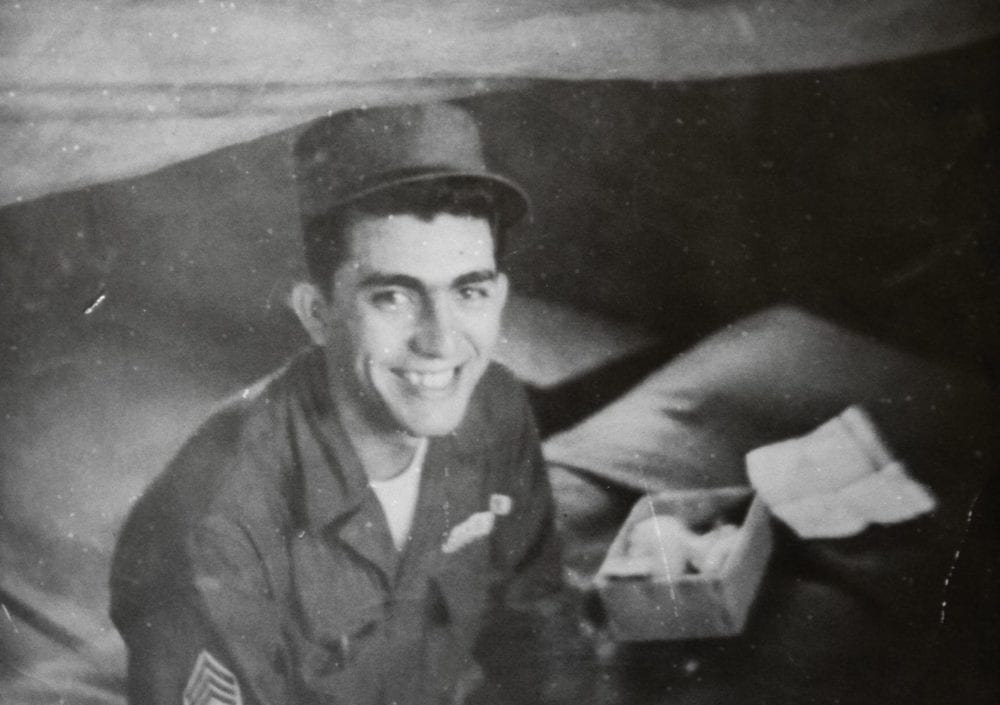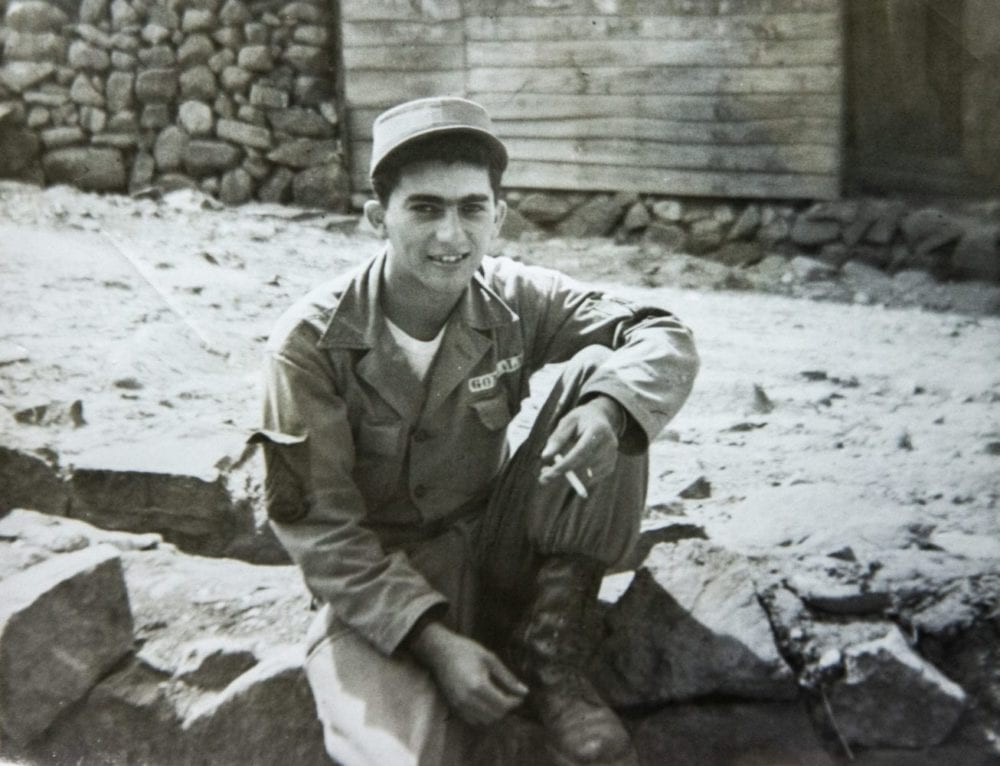Editor’s note: Edward Gonzales’ family name is spelled with a Z at the end. However, an error on his birth certificate spelled it with an S, so when he enlisted in the Army he was enlisted as Edward Gonzales. We have retained that spelling here.
The story of Edward Gonzales is that of duality: a fight between following in the footsteps of his father or grandfather.
His father, Wayne, had been a laborer, using his hands to create beautiful pieces of woodwork but receiving little pay for the hours he spent on his craft.
His grandfather, whose first name the family no longer knows, was a young bandit in turn-of-the-century Mexico, living a life robbing people, running with a gang, and even shooting someone to death in a bar fight.
Wayne Gonzalez taught his son his belief in honest work that engages one’s creative side. But the grandfather in Edward’s blood wanted to be bold, romantic and macho.
This internal dichotomy, whether he knew it or not, would lead him to be an artist like his father, and have a chip on his shoulder like his grandfather. But, in Korea, surrounded by soldiers and hostile environments, Edward would decide which part of him would need to win out.
Early Life
Edward Gonzales was born May 20, 1931, in Tucson, Arizona, the oldest child to a homemaker and journeyman carpenter. But after about seven months of not liking it in the Arizona sun, his father would commit himself, his wife and only child at that time to what would become a Gonzales family norm: moving.
“I remember being about 4 years old and at the time we were living out here in Venice,” said Gonzales. “As I was growing up, we were moving about once a year.”
However, despite the constant shuffling from one area to another, one thing stayed the same, which was Gonzales, sitting in the backyard of whichever house he and and his family lived in that month, watching and learning his father’s craft of carpentry.
“When I got old enough, I was always in the backyard, mixing concrete or learning woodworking, always watching my Dad.”
Gonzales said his father was paid by doctors and office managers throughout the Southland to make cabinets and furniture, but his true artistry was in not what he made, but how he went about making it.
“He did beautiful work, but often times didn’t have the money to buy the supplies and he needed to start making up stuff,” said Gonzales. “Like when he made a cedar chest, he needed something to press together the various layers. So he made up a jack, hanging it from the rafters in our garage.”
As Gonzales prepared to enter his teenage years, his father had found steady work in Burbank, where Gonzales and his younger brother could take years of creative apprenticeship and put those skills to use in a variety of ways at John Burroughs High School.
Having a chip on his shoulder, Gonzales was very popular, becoming an outstanding athlete, president of the Letterman’s and Boys’ League clubs, an ace student and was recognized by the American Legion as a leader on campus.
But despite these early successes, much like other people his age at the time, college was out of the question — but service in the military could become an answer to that conundrum.

Bandit
On Feb. 7, 1951, Edward Gonzales walked into a recruiter’s office and signed up for the United States Army.
After a series of short stints in various military training camps back in the states, Gonzales was shipped off to Korea with plans to be a radio operator. But once he landed overseas, logistical operators realized that the new recruit’s talents would be wasted with a radio strapped to his back.
“Radio operators on the front lines didn’t last long, (because) the antennas stick out and the operators get targeted.”
Instead of being sent to the front, he was transported to Busan, South Korea, where he would work in intelligence operations. Gonzales’ job was to gather newspapers for the officers, manage supplies sent by quartermasters and — due to his background in woodworking and carpentry — build and operate the non-commissioned officers’ bar.
“I was the guy you would come to for anything,” said Gonzales, adding that the wish lists for the enlisted men included everything from candy, to cigarettes to high-end whiskey. “If you wanted it, I would find a way to get it.”
“One time, though, we had a general come visit the base. And the officers came down and took all the goodies I had bought so that they could entertain this general.”
Gonzales said that once he found out that the higher-ups had commandeered the stockpile, he stormed upstairs, barged through the officers’ door and in front of all of them said, “This is not yours and these belong to the men.”
“I was halfway down the stairs when I finally realized what I had done, and I thought to myself, ‘Oh my god, I’m going to jail.’”
But when those officers finally caught up to him, had him detained him and claimed he was insubordinate for taking back everything they had stolen, the general walked out.
“He ordered, ‘You let that man go right now. He’s just doing his job.’”
Teacher
During that time when he was applying his father’s woodworking and critical thinking lessons to running the NCO club, Gonzales was also exercising the second skill his father showed him how to do in those outdoor woodworking sessions: teaching.
“While I was there they wanted me to help the troops get an education,” said Gonzales. “Thirty percent of our troops, at that time, could not read or write.”
Gonzales said he took whatever trains and planes were available to him, from outpost to outpost, so he could administer tests and help teach reading and writing to the deployed troops.
“I hated it,” said Gonzales. “They’d put me in the mail plane … where I’d have to bunker down, hold the mail sacks close to my body and stay low. Or they’d send me by train and those sometimes took two days just to get me where I needed to go.”
But while he was teaching, in the same authoritative but effective way that his father had taught him all those years ago, the real challenges for him during the war began.
“We’d have officers that wouldn’t know how to read or write,” said Gonzales. “And they didn’t want to openly take the classes because it would be embarrassing for them.”
Not wanting to humiliate or demean officers in front of their men, but wanting them to still receive an education, the Army sergeant-turned-teacher concocted a plan.
“I told them that I would spread the word that they were there to ‘keep an eye on the troops,’ but that they could follow the lessons and secretly learn alongside the men. Most of the other teachers wouldn’t know why the officers were really there.”

The Battle
After what he would characterize as an “interesting year” in Korea, Gonzales would be sent home to his Dorothy, who he had married four months before he had been shipped off to Korea.
He was honorably discharged three years later on Jan. 8, 1954, as an E-5 sergeant and received recognition as a veteran of the Korean conflict.
He and his wife would go on to have three kids, Paul, Michael and Tammy.
Gonzales supported his family by continuing to work as both an engineer and instructor in the private sector, despite not having a college degree. He established a successful career that lasted for more than three decades with companies up and down California, helping them improve their manufacturing processes.
He now proudly showcases albums full of pictures of his own inventions, as well as paintings and drawings that, at the age of 87, he still illustrates.
But there’s one memory that seems to still impact him the most; one idea that comes to his head that he knows changed his life forever.
“One time, back when I was still teaching in Korea at a compound south of Seoul, a big soldier-student of mine, 6 foot 6 inches and weighing 280 pounds at least, asked, ‘Sergeant, can I see you behind that shed over there.”
Gonzales figured that since he had pushed this student in the classroom, likely embarrassing him in front of his comrades in arms, this soldier likely wanted to “beat the s—” out of him.
“In those days we carried carried sidearms along with us, and as we were heading out to the shed, I saw (the soldier’s) body shaking. He was laughing at me.”
As they turned the corner, trudging through the weeds, Gonzales began to channel his gunslinging grandfather and unclip his sidearm holster.
“I wasn’t going to let him lay a finger on me.”
But then, as the much larger sergeant turned around, Gonzales looked up and met eyes not filled with malice, but tears.
“I froze because he turned around and he wasn’t laughing or preparing to hurt me,” said Gonzales. “He was shaking because he was crying.”
Holding back tears himself as he sits in his art- and photo-laden Valencia apartment, six decades later, Gonzales said he still can’t tell this story without crying.
“He gets turned around, and says to me, ‘I don’t know how to thank you,’” said Gonzales. “He says, ‘None of these people have to read me my letters anymore, and when my wife writes me I can write her back, by myself, because of you. Can I give you a hug.’”
Gonzales said he stood there shocked as the chip he had carried on his shoulder because of his “bandit” relative, dissipated.
“And I’m just thinking to myself, ‘I almost killed this poor bastard,’” said Gonzales.
From then on, and for the rest of his life, Gonzales said he finally understood what his father had been teaching him all those years. He said that for the rest of his life, he would try to be like his father, Wayne Gonzalez.














